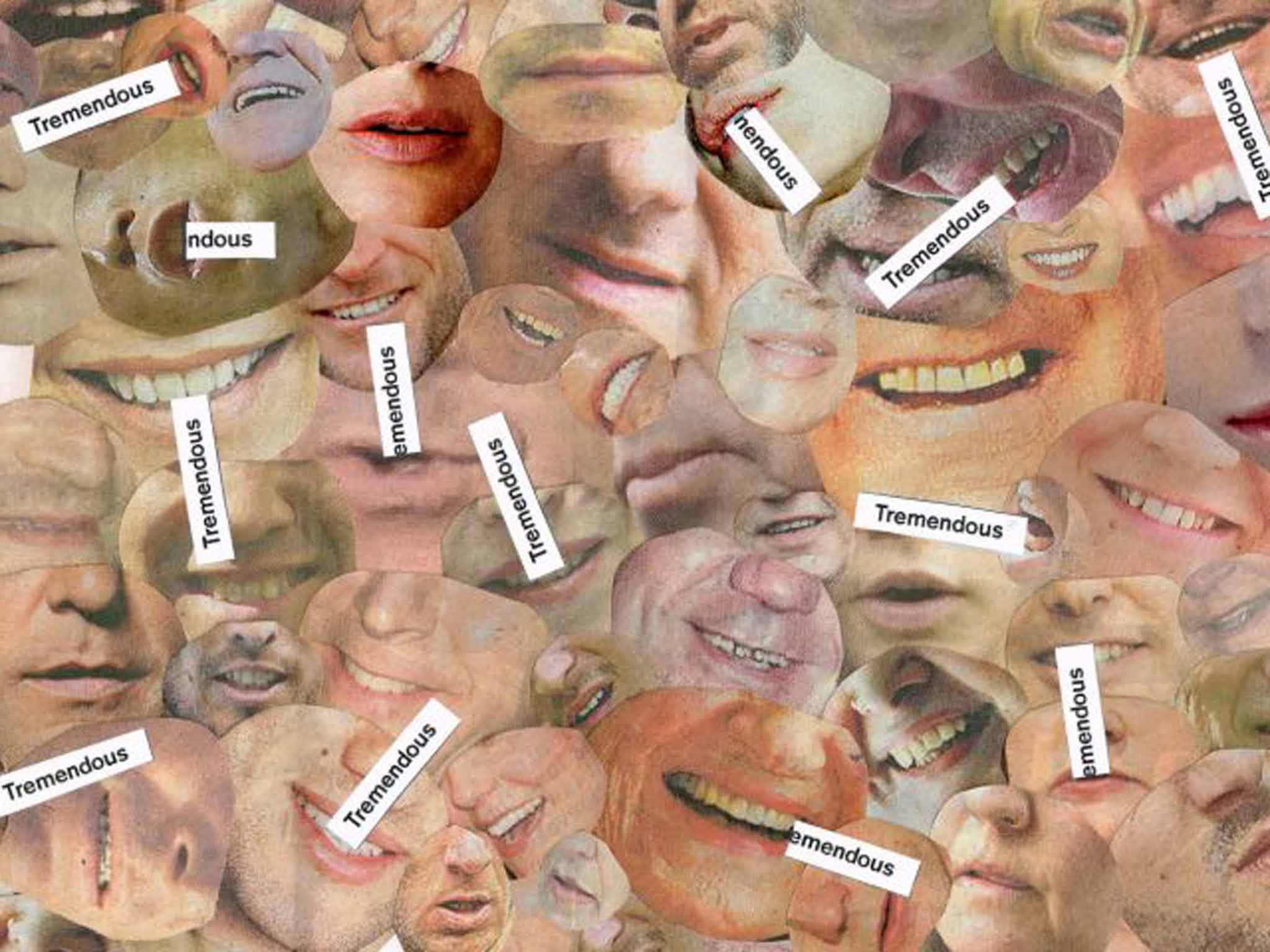What are your fingerprint words?
In Matthew J X Malady's case, it's 'iteration'. He uses it over and over again. But we all need our own particular language to separate from the crowd, he explains – and there's nothing worse than someone stealing your mot juste

Your support helps us to tell the story
From reproductive rights to climate change to Big Tech, The Independent is on the ground when the story is developing. Whether it's investigating the financials of Elon Musk's pro-Trump PAC or producing our latest documentary, 'The A Word', which shines a light on the American women fighting for reproductive rights, we know how important it is to parse out the facts from the messaging.
At such a critical moment in US history, we need reporters on the ground. Your donation allows us to keep sending journalists to speak to both sides of the story.
The Independent is trusted by Americans across the entire political spectrum. And unlike many other quality news outlets, we choose not to lock Americans out of our reporting and analysis with paywalls. We believe quality journalism should be available to everyone, paid for by those who can afford it.
Your support makes all the difference.Not too long ago, I was forced to come to grips with something terrible about myself. I use the word iteration a lot. More than any human being should. If I had put a ballpark figure on it, I'd set the over/under on daily utterances at five.
I'm not proud of this. I'd prefer to be someone who can refer to a version or edition or plain old instance of something, and who doesn't go around saying iteration over and over again. Alas, that is not me. And I found out about my iteration malady in the most jarring way possible. I had just started a new job. One day, a few weeks in, I heard three different colleagues with whom I interact often use the word iteration independently of one another. When the third of these, a woman I knew prior to taking the job, said it, I stopped her mid-sentence. "Wait, did you just say iteration? Why is everyone saying that word here?" Her response hit me like an unabridged thesaurus to the dome. "You should be psyched," she shot back. "That's one of your words."
After a fit of denial, and some back-and-forth, I went home after work and asked my wife if there were any weird, fingerprint-type words I used often. "You mean like iteration?" she said, without the slightest pause. Then the floodgates opened. "You also say tangential all the time. Oh, antiquated, too! And you're always talking about the extent to which someone did this or that."
She kept going. Turns out I have an affinity for anachronism and maintain a close connection with cognisant.
When our fingerprint words go mainstream, our response seems to depend largely on who's doing the taking.
By the time I returned to work the next day, I had begrudgingly accepted that I overuse a bunch of goofy words, and that everyone around me knew it. But I also noticed a change in how I spoke to my colleagues at the office. I was just as apt as ever to pepper a sentence with antiquated, or to throw in an extent to which here and there, but I actively and consciously stopped using iteration. That was my word, even though I hadn't realised it until the day before. Now everyone was saying it. I didn't want to appear a mere imitator when I used this noun that now seemed to belong to me.

Since the iteration incident, I've noticed myself doing this with different words in other contexts. And that got me thinking about the extent to which we all grow attached to or spread or sometimes begrudgingly jettison specific, just-barely-uncommon fingerprint words. When I recently asked several people whether they maintained any such words of their own, or if they were aware of fingerprint words used by loved ones, colleagues, and other acquaintances, the responses poured in. Nuanced. Terrific. Dichotomy. And whatnot. Friends in academia complained about colleagues overusing discourse and reify. And nearly everyone had an anecdote about some pet word being passed from one person to another in various social settings – or, in the case of an editor colleague of mine, her fingerprint word, delightful, ascending among Silicon Valley folks and sadly rendering her a walking cliché.
So it seems as though we all have our own fingerprint words, and we're all simultaneously donating to and stealing from those around us. But how do we pick up these linguistic signature words, and what is going on when we notice other people using those words and we feel, well, a certain way about it?
Diana Boxer, a professor at the University of Florida who specialises in sociolinguistics, says that when we find ourselves in a situation where someone uses language differently to the way we do, or words we're unfamiliar with, we usually respond in one of two ways. "We either start to mimic them in some way, or distinguish ourselves from their usage," she says. "This has to do with how we want to portray our identities. If we identify with them, want to be like them, we'll start speaking like they do."
So, Boxer continues, when those around us snatch our fingerprint words, we should be flattered. "In your case, with iteration, you probably heard it or read it somewhere and identified with the usage or user," she says. "You then took it on. Others around you did the same. This is a compliment to you."
But according to Stanford psychology professor Benoît Monin, I shouldn't pat myself on the back too fervently. In many cases, when we decide to latch on to these sorts of words, it's because we're using language to put on a show. "There could be some element of language snobbery here," says Monin, whose research focuses on self-image and social norms. "Like, 'I'm a discriminate language user, and I use these rare words that few people use, and by using them I show that I'm educated.'"
Even more behaviourally suspect, of course, is the take-my-ball-and-go-home response I had to the workplace iteration appropriation I experienced. It seems rather unreasonable to become upset, or to change my manner of speaking, simply because a few people might have plucked one of these semi-uncommon words from my lexicon and begun using it with some frequency. Of all things to fuss and fret over, that perceived injustice is an especially odd one. But my silly reaction is not all that unusual, it turns out.
Monin draws an analogy to the phenomenon of someone ordering the same meal as you at a restaurant, or starting to wear bow ties to the office after you've begun doing so. "There is a lot of ambivalence there," he says. "On the one hand, we like that people admire or respect our choices. And to some extent we like being a leader. But there's something also uncomfortable about people mimicking us. We want people to say, 'Oh, that's great', but not to start imitating us."
And when they do, we can respond in strange ways. For one thing, we don't want to be viewed as followers, and we may go far out of our way to avoid that perception. Research by Dan Ariely, a Duke University professor, and Stanford's Jonathan Levav indicates that people in a group at a restaurant will sometimes go so far as to order a menu item that they will almost certainly enjoy less rather than choose a dish already selected by several members of their dining party. (I love crab legs, and would order them 100 times out of 100 when dining alone. But if everyone before me in a group of 10 colleagues about to chow down at a seafood restaurant orders the crab, I might get the salmon.) Ariely and Levav say that there exists "the desire to portray oneself as interesting and unique" when we interact with others, and that we will in some cases make irrational decisions to avoid looking like a copycat.
When we feel as though others have borrowed their hip new pet words from us, this desire not to be seen as a follower can kick in. And those who think of themselves as language innovators, Boxer says, will be quick to abandon a usage if it grows too common – probably griping and huffing about the fingerprint-word theft in the process.
Not surprisingly, there's a lot going on when we complain about people parroting our linguistic idiosyncrasies. By raising such objections in the presence of others, we not only make sure everyone is aware of our leadership and our tendency to innovate, we also establish that we were doing this newly popular thing prior to all those who jumped on the bandwagon. In other words, our grousing about fingerprint-word usurpation may amount to another display of sorts – a language humblebrag brimming with faux outrage.
But when our fingerprint words go mainstream, our response seems to depend largely on who's doing the taking. For many of us, seeing one of our pet words find its way into the verbal landscape of the jerk down the hall who makes inappropriate jokes at staff meetings would be annoying. But swap in a different bandwagon jumper and everything changes.
"If you talked to President Obama today," Monin says, "and then you noticed that tonight, in his speech to the nation, he used the word iteration, you'd probably feel pretty good about that."
Alas, it's unlikely that I'll be meeting the President in the near future to chat about various versions of proposed legislation or possible revisions to policy presentations or other iterative endeavours. So I won't be passing on any pet words to the leader of the free world any time soon.
But I also won't become one of those people who goes around stealing the fingerprint words of others. How lazy! How unoriginal! How lame! How long after writing those last few sentences was it before I could think of a time when I engaged in the exact sort of behaviour that so infuriated me at the office? About four seconds.
I did it a few months ago. One of my closest friends uses the word tremendous often in emails. I'll send him a link to some especially outstanding baseball catch or a stupid screaming goat video, and he'll reply, succinctly, "That is tremendous." Or he'll email me an article prefaced with, "This is a tremendous story." It works for him. It really does. And, without knowing it, I've snatched that word from him like nobody's business.
I didn't realise this until July, when a different friend responded to one of my own emails by giving me props for my unusual word choice. "Also, great use of tremendous," she wrote near the end of her correspondence. This prompted a review of my sent folder, which confirmed that the word is now pervasive in my outgoing emails. "What an old-school term," she added. "Let's bring that back!"
© Slate.com
Join our commenting forum
Join thought-provoking conversations, follow other Independent readers and see their replies
Comments